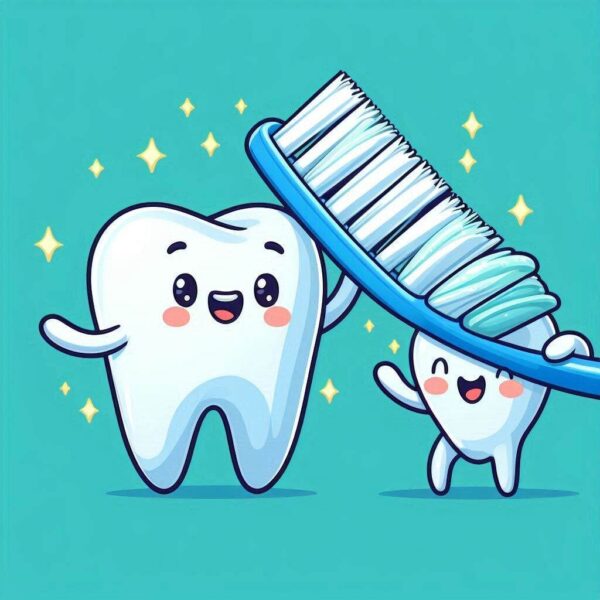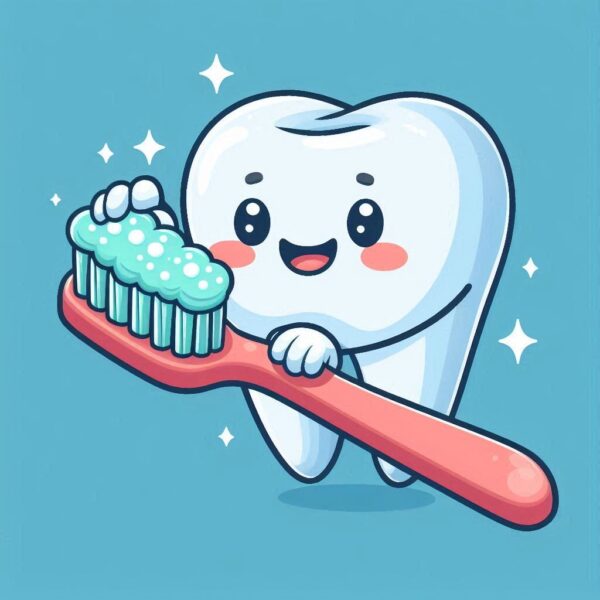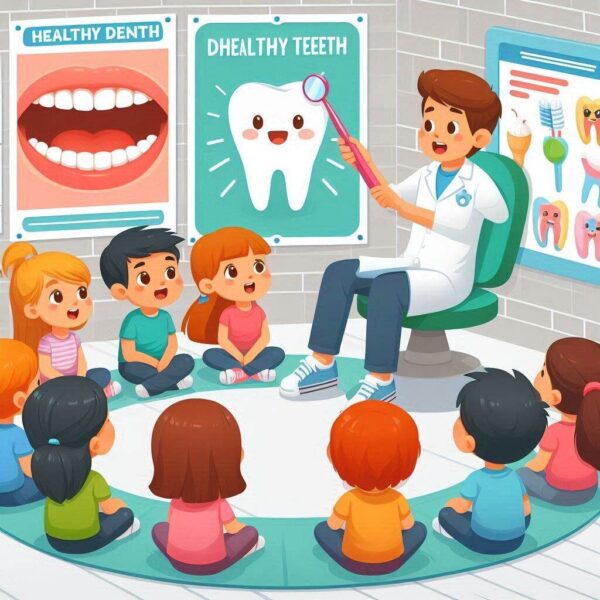
Brushing your teeth is essential for maintaining oral health. It helps remove plaque, a sticky film of bacteria that forms on your teeth and gums.
Plaque can lead to tooth decay and gum disease if not regularly cleaned. Brushing also helps remove food particles and stains, keeping your teeth clean and bright.
Fluoride toothpaste strengthens tooth enamel, making it more resistant to decay. Additionally, brushing stimulates the gums, promoting healthy blood flow and reducing the risk of gum disease.
Regular brushing, at least twice a day, is a simple yet crucial practice for preventing dental problems and maintaining a healthy smile.
How Does Brushing Help Your Teeth

The Role of Plaque Removal
What is Plaque?
Plaque is a sticky film of bacteria that forms on your teeth and gums. It develops when the bacteria in your mouth mix with sugary or starchy foods. If not removed regularly, plaque can harden into tartar, leading to more severe dental issues.
Preventing Tooth Decay
Brushing helps remove plaque from your teeth, preventing it from turning into tartar. By doing so, it reduces the risk of tooth decay, cavities, and other related problems. Fluoride toothpaste is particularly effective in this process, as it helps strengthen tooth enamel, making it more resistant to decay.
Gum Health
Preventing Gum Disease
Brushing your teeth not only cleans your teeth but also stimulates your gums. This stimulation helps maintain healthy gum tissue and promotes good blood flow. Removing plaque from the gum line prevents gingivitis, the early stage of gum disease, which can progress to periodontitis if untreated.
Fresh Breath
Removing Food Particles and Bacteria
Bad breath, or halitosis, is often caused by food particles and bacteria left in the mouth. Brushing your teeth helps remove these particles and reduces bacterial growth, leading to fresher breath. Using toothpaste with antibacterial properties can further enhance this effect.
Aesthetic Benefits
Whitening Effects
Regular brushing helps remove surface stains from your teeth, keeping them whiter and brighter. While it may not be as effective as professional whitening treatments, consistent brushing can help maintain a cleaner, more attractive smile.
Strengthening Tooth Enamel
Fluoride Benefits
Most toothpaste contains fluoride, a mineral that strengthens tooth enamel. Fluoride helps remineralize weak spots on the enamel, making teeth more resistant to acid attacks from plaque bacteria and sugars in the mouth. This is crucial in preventing cavities and maintaining strong teeth.
Overall Health Benefits
Preventing Systemic Issues
Good oral hygiene, including regular brushing, can have positive effects on your overall health. Poor oral health has been linked to various systemic issues, such as heart disease, diabetes, and respiratory infections. By maintaining healthy teeth and gums, you can reduce the risk of these health problems.
Effective Brushing Techniques
Proper Brushing Method
To maximize the benefits of brushing, it’s important to use the correct technique. Use a soft-bristled toothbrush and fluoride toothpaste. Hold the brush at a 45-degree angle to your gums and use gentle, circular motions.
Brush all surfaces of your teeth, including the front, back, and chewing surfaces. Don’t forget to brush your tongue to remove bacteria and freshen your breath.
Brushing Duration
Dentists recommend brushing your teeth for at least two minutes, twice a day. Setting a timer or using an electric toothbrush with a built-in timer can help ensure you brush for the appropriate amount of time. I hoe now your fully aware of how does brushing help your teeth.
Is Daily Brushing Teeth Necessary For Healthy Teeths

Importance of Daily Brushing
Plaque Removal
Daily brushing is essential for removing plaque, a sticky film of bacteria that forms on your teeth and gums. Plaque can lead to tooth decay and gum disease if not removed regularly.
Preventing Tooth Decay
By brushing daily, you reduce the risk of cavities and tooth decay. Fluoride toothpaste helps strengthen tooth enamel, making it more resistant to decay.
Gum Health
Preventing Gum Disease
Brushing your teeth stimulates your gums and removes plaque from the gum line. This helps prevent gingivitis, the early stage of gum disease, and promotes overall gum health.
Reducing Inflammation
Daily brushing helps reduce inflammation and bleeding in the gums, which are common signs of gum disease.
Fresh Breath
Removing Bacteria
Bad breath is often caused by bacteria in the mouth. Brushing daily helps remove these bacteria, resulting in fresher breath.
Eliminating Food Particles
Daily brushing removes food particles that can contribute to bad breath and bacterial growth.
Aesthetic Benefits
Whiter Teeth
Regular brushing helps remove surface stains, keeping your teeth whiter and brighter.
Preventing Stains
Daily brushing prevents the build-up of stains from foods, drinks, and tobacco.
Overall Health Benefits
Preventing Systemic Issues
Good oral hygiene, including daily brushing, can reduce the risk of systemic health issues such as heart disease, diabetes, and respiratory infections.
Maintaining Oral Health
Daily brushing is crucial for maintaining overall oral health and preventing a range of dental problems.
Effective Brushing Techniques
Proper Method
To maximize the benefits of brushing, use a soft-bristled toothbrush and fluoride toothpaste. Brush for at least two minutes, covering all surfaces of your teeth and your tongue.
Frequency
Brush your teeth at least twice a day, preferably in the morning and before bed. Brushing after meals is also beneficial.
What Happens If We Don’t Brush Our Teeth

Immediate Effects
Plaque Buildup
When you don’t brush your teeth, plaque quickly starts to build up. This sticky film of bacteria can form within hours of eating and can harden into tartar if not removed.
Bad Breath
One of the first noticeable effects of not brushing your teeth is bad breath, also known as halitosis. This occurs because food particles and bacteria remain in your mouth, producing unpleasant odors.
Short-Term Effects
Tooth Decay
Plaque buildup leads to the production of acids that attack tooth enamel. Over time, this can cause cavities, small holes in the teeth that require dental fillings to repair.
Gum Disease
Without regular brushing, plaque can spread and grow below the gum line, causing gingivitis, the earliest stage of gum disease. Symptoms include red, swollen, and bleeding gums.
Long-Term Effects
Periodontitis
If gingivitis is left untreated, it can progress to periodontitis, a more severe form of gum disease. This condition affects the tissues and bones that support your teeth, potentially leading to tooth loss.
Tooth Loss
Advanced gum disease and severe tooth decay can ultimately lead to the loss of teeth. This not only affects your ability to eat and speak properly but also impacts your overall appearance and self-esteem.
Systemic Health Issues
Heart Disease
Poor oral hygiene has been linked to an increased risk of heart disease. Bacteria from the mouth can enter the bloodstream and contribute to the formation of arterial plaques, leading to heart problems.
Diabetes
There is a strong connection between gum disease and diabetes. Poor oral health can make it more difficult to control blood sugar levels, worsening the condition of diabetes.
Impact on Daily Life
Difficulty Eating
Tooth decay and gum disease can make eating painful and difficult. This may lead to poor nutrition as you avoid certain foods that are hard to chew.
Aesthetic Concerns
Neglecting oral hygiene can lead to visible tooth decay, discoloration, and missing teeth, which can significantly affect your appearance and confidence.
Effective Oral Hygiene Practices
Daily Brushing
To prevent these negative effects, brush your teeth at least twice a day with fluoride toothpaste. Use a soft-bristled toothbrush and brush for at least two minutes, ensuring you cover all surfaces of your teeth.
Regular Flossing
Flossing daily helps remove plaque and food particles between teeth that a toothbrush can’t reach, reducing the risk of gum disease and cavities.
Routine Dental Check-Ups
Visit your dentist regularly for check-ups and professional cleanings. This helps catch any potential issues early and keeps your teeth and gums healthy.
What Are the Benefits of Brushing Teeth Daily?

Introduction
Daily brushing is a cornerstone of oral hygiene and is vital for maintaining healthy teeth and gums. The benefits of brushing your teeth go beyond just having a bright smile; it plays a crucial role in preventing dental and systemic health issues. Here’s a detailed look at why brushing your teeth every day is essential.
Oral Health Benefits
Plaque and Tartar Prevention
Brushing your teeth daily helps remove plaque, a sticky film of bacteria that forms on your teeth and gums. If not removed, plaque can harden into tartar, which can only be removed by a dentist. Regular brushing prevents this buildup, protecting your teeth and gums.
Cavity Prevention
Plaque produces acids that attack tooth enamel, leading to cavities. Fluoride toothpaste helps strengthen enamel and makes it more resistant to decay. By brushing daily, you significantly reduce the risk of developing cavities.
Gum Disease Prevention
Plaque buildup along the gum line can lead to gingivitis, the early stage of gum disease. Symptoms include red, swollen, and bleeding gums. Regular brushing helps remove plaque from the gum line, preventing gingivitis and its progression to more severe gum disease like periodontitis.
Aesthetic Benefits
Whiter Teeth
Daily brushing helps remove surface stains caused by foods, drinks, and tobacco. This keeps your teeth looking whiter and brighter, enhancing the appearance of your smile.
Fresh Breath
Brushing your teeth removes food particles and bacteria that cause bad breath. Using toothpaste with antibacterial properties can further help in keeping your breath fresh.
Systemic Health Benefits
Heart Health
Good oral hygiene, including daily brushing, has been linked to a reduced risk of heart disease. Bacteria from gum disease can enter the bloodstream and contribute to the formation of arterial plaques, increasing the risk of heart problems.
Diabetes Management
There is a bidirectional relationship between oral health and diabetes. Gum disease can make it harder to control blood sugar levels, and high blood sugar can worsen gum disease. Regular brushing helps manage both conditions.
Preventing Other Health Issues
Respiratory Health
Poor oral hygiene can lead to respiratory infections. Bacteria from the mouth can be inhaled into the lungs, causing infections such as pneumonia, especially in individuals with weakened immune systems.
Pregnancy Complications
Pregnant women with poor oral hygiene and gum disease are at a higher risk of complications such as preterm birth and low birth weight. Daily brushing helps maintain oral health during pregnancy, reducing these risks.
Psychological and Social Benefits
Increased Confidence
A clean, healthy smile can boost your confidence and self-esteem. Regular brushing helps you maintain a bright, attractive smile that you can be proud of.
Better Social Interactions
Fresh breath and a healthy smile can positively impact your social interactions. People are more likely to engage with you if you have good oral hygiene.
Effective Brushing Techniques
Proper Brushing Method
To get the most benefit from brushing, use a soft-bristled toothbrush and fluoride toothpaste. Brush for at least two minutes, twice a day. Make sure to cover all surfaces of your teeth and your tongue.
Flossing and Mouthwash
Complement daily brushing with flossing and using mouthwash. Flossing removes plaque and food particles between teeth, and mouthwash can help kill bacteria and freshen your breath.
Conclusion
Brushing your teeth daily is fundamental to maintaining optimal oral health. It effectively removes plaque and bacteria, preventing tooth decay and gum disease.
Consistent brushing also helps maintain fresh breath, whiter teeth, and overall systemic health, reducing risks of conditions like heart disease and diabetes. Furthermore, good oral hygiene boosts confidence and enhances social interactions.
By adopting proper brushing techniques and incorporating flossing and mouthwash into your routine, you can ensure a healthy, attractive smile for life. I hope now you are fully aware of how does brushing help your teeth.
FAQs
Q1. How often should I brush my teeth?
A1. You should brush your teeth at least twice a day, ideally in the morning and before bed.
Q2. What type of toothbrush should I use?
A2. A soft-bristled toothbrush is recommended to avoid damaging your gums and enamel. Electric toothbrushes can also be effective.
Q3. Is fluoride toothpaste necessary?
A3. Yes, fluoride toothpaste strengthens tooth enamel and helps prevent cavities.
Q4. Can brushing too hard damage my teeth?
A4. Yes, brushing too hard can wear down enamel and irritate your gums. Use gentle, circular motions to brush your teeth.
Q5. How long should I brush my teeth each time?
A5. You should brush for at least two minutes each time to ensure all surfaces of your teeth are thoroughly cleaned.
